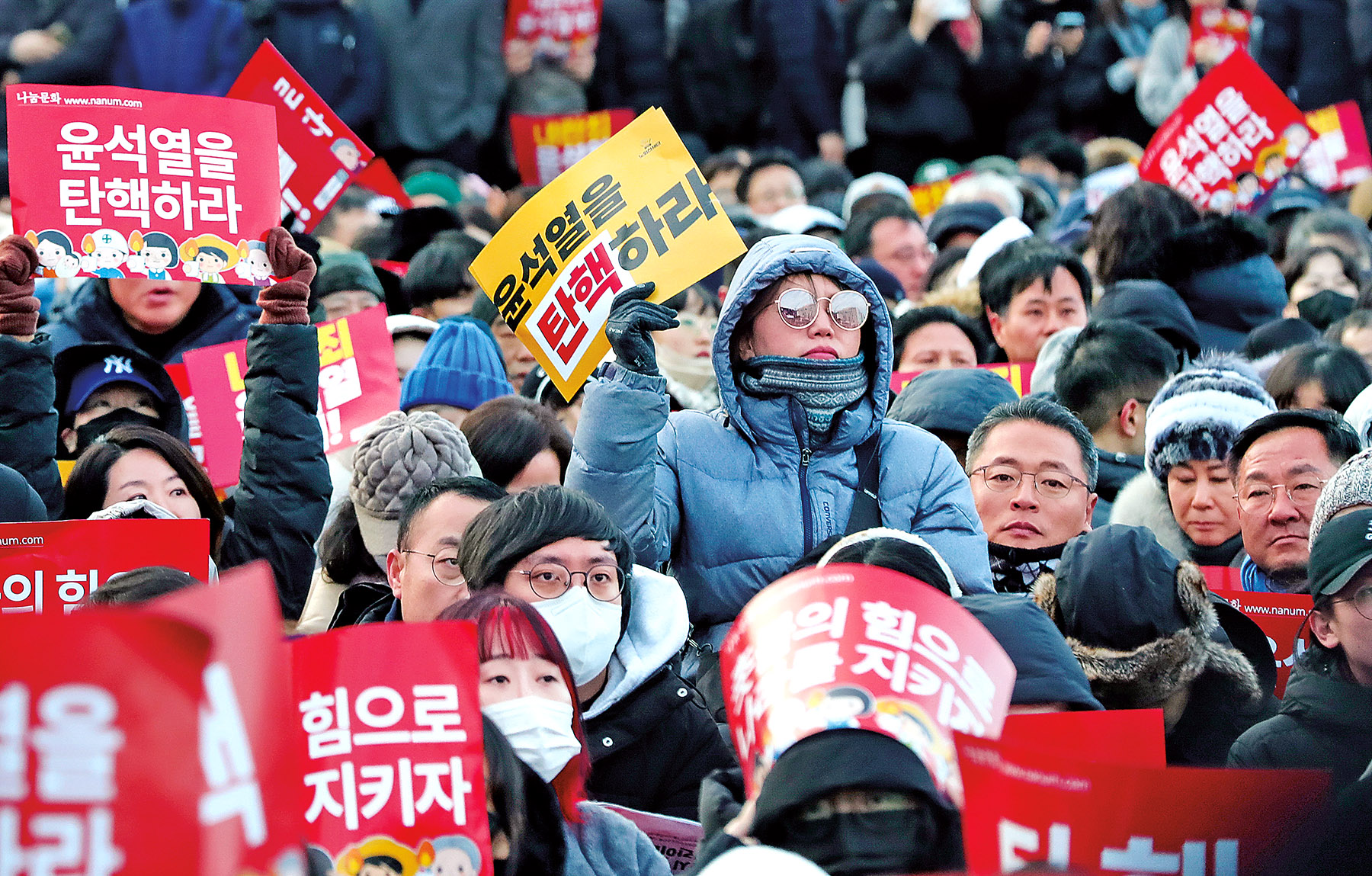ROK leader draws more criticisms for defending martial law fiasco as act of governance

Republic of Korea (ROK) President Yoon Suk-yeol said on Dec 12 that he will fight till the end as he described his recent short-lived martial law declaration as an act of governance.
In a televised speech, Yoon said the opposition is the one that paralyzed the government by abusing impeachment provisions and thwarting him and other top officials since he took office. He said that he used his presidential power to declare martial law to protect the nation and normalize the functioning of the state.
“Whether it is impeachment or investigation, I will stand up to it,” said Yoon, adding that he will not avoid legal and political responsibility regarding the martial law decree.
Yet Yoon’s speech caused more protests from officials and the laymen. Ruling People Power Party chief Han Dong-hoon, dissatisfied, called an emergency meeting to discuss the expulsion of Yoon from the party. National Assembly Speaker Woo Won-shik said Yoon’s intention to use the martial law declaration to warn the National Assembly is unacceptable.
ROK police failed to raid the presidential office on Dec 11 as the presidential security service refused to cooperate with their investigation. Instead, Yoon’s office voluntarily submitted “very limited” documents and materials to the police.
The embattled president continued to fight for his political survival a week after plunging the country into chaos by briefly imposing martial law.
On Dec 10, the ROK’s Justice Ministry said that Yoon has been banned from leaving the country. The same day also saw the National Assembly pass a bill mandating a permanent special counsel to investigate treason charges over Yoon’s martial law declaration.
The bill’s passage marked the first time in ROK’s constitutional history that public prosecutors, police, the Corruption Investigation Office for High-ranking Officials (CIO), and a special prosecutor have launched simultaneous investigations into the same case.
On Dec 11, raids were also conducted at the National Police Agency and offices of the Seoul Metropolitan Police and the National Assembly Police Guards, Yonhap News Agency reported.
The country’s anti-corruption investigation body said that it would seek to detain or arrest Yoon if conditions were met.
“If the situation allows, we will attempt to make an emergency arrest or an arrest based on a court warrant,” said CIO chief Oh Dong-woon at a parliamentary legislation committee meeting.
Amid the continuing political uncertainty, former defense minister Kim Yong-hyun attempted suicide at his detention center late Dec 10, shortly before a court issued a warrant to arrest him.
An alumnus of Yoon’s high school, Kim assumed the defense portfolio in September. He resigned last week to take responsibility for the imposition of martial law.
Prosecutors believe that Kim proposed the declaration of martial law to Yoon and also ordered the deployment of troops to the National Assembly compound and the headquarters of the National Election Commission.
Kim was in stable condition after the suicide attempt, according to the Justice Ministry.
The main opposition Democratic Party plans to introduce a new impeachment motion against Yoon in the National Assembly on Dec 12, which is expected to be put to a vote on Dec 14.
The first impeachment vote on Dec 7 failed after most members of the ruling party boycotted the session.
With the opposition bloc holding 192 of the legislature’s 300 seats, at least eight votes from the PPP are needed to reach the two-thirds majority required for impeachment.
Prime Minister Han Duck-soo would temporarily take over presidential responsibilities if the second impeachment motion gets passed in the National Assembly.
In a plenary parliamentary session on Dec 11, Han Duck-soo told lawmakers that although he attended an emergency closed-door cabinet meeting on Dec 3 before the martial law declaration, he had opposed the declaration out of concerns over South Korea’s economy and reputation.
Han added that he had no prior knowledge of the declaration before the meeting.
Apart from Yoon, several top officials, including Commissioner General of the Korean National Police Agency Cho Ji-ho, have also been banned from leaving the country.
As ROK reels from the aftermath of the short-lived martial law, concerns are growing the diplomatic and economic repercussions.
Uncertainties surrounding the nation’s economy have increased, with analysts worrying that the prolonged political crisis may even affect the country’s credit rating.
There are also worries over a “diplomatic vacuum” in the country as high-ranking overseas officials canceled planned visits to the ROK.
United States Defense Secretary Lloyd Austin canceled plans to visit Seoul, deeming it not the appropriate time, while Swedish Prime Minister Ulf Kristersson’s visit has been postponed, according to Reuters.
A trip by former Japanese prime minister Yoshihide Suga, which had been set for later this month, was also canceled. Also, Japan News reported that a planned visit by Prime Minister Shigeru Ishiba in January “has become almost impossible” to realize.
In the short term, most countries are going to adopt a wait-and-see attitude in their relations with ROK, said Mason Richey, professor of international politics at Hankuk University of Foreign Studies in Seoul.
He added that the ROK will need to re-establish a sense of normalcy.


